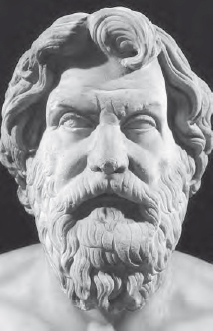Ancient PhilosophyHellenistic and Roman Philosophy |
What is Epicureanism? |
Unlike its namesake today, which connotes an enjoyment of good food and fine wine, ancient Epicureanism was an austere doctrine. It was founded by Epicurus (341–271 B.C.E.) and his colleagues Metrodorus of Lampsacus (331–277 B.C.E.), Hermarchus (dates unknown), and Polyaenus (dates unknown). Epicurus set up communities at Mytilene, Lampsacus, and on the outskirts of Athens, where his school was known as “The Garden.” Epicurean practice required detachment from political life—although not opposition to it—and time spent in philosophical discussion with friends.
Epicurus wrote “letters” on physics, astronomy, and ethics, as well as maxims, and a major work, On Nature, little of which has survived. He was an atomist, as Democratus (c. 460–371 B.C.E.) had developed the theory, except that he thought atoms themselves contained sets of “minima” (parts of atoms that cannot be further divided). According to Epicurus, the atoms are in constant motion, with swerves and collisions that have resulted in the formation of bodies as we experience them. There is nothing godlike outside of life and society as we known them, and the gods should just be viewed as ideal models for our own behavior. Death is not to be feared, because we will merely dissolve into our constituent atoms, which are incapable of feeling pain—or anything else.
Epicurean ethics held that pleasure is our only good; it is better even than virtue. Pain is the only evil. Pleasure should be sought in stable ways, which makes a simple life necessary. We should satisfy only our most necessary desires in the company of friends like us. The highest pleasures are “katastematic,” or those related to satisfaction. The “kinetic” pleasures that result from stimulation merely increase our insecurity (they are like desires). Our ultimate goal should therefore be the absence of pain via a simple life for the body and the study of physics for the soul. This will result in ataraxia, or “freedom from disturbance.”

